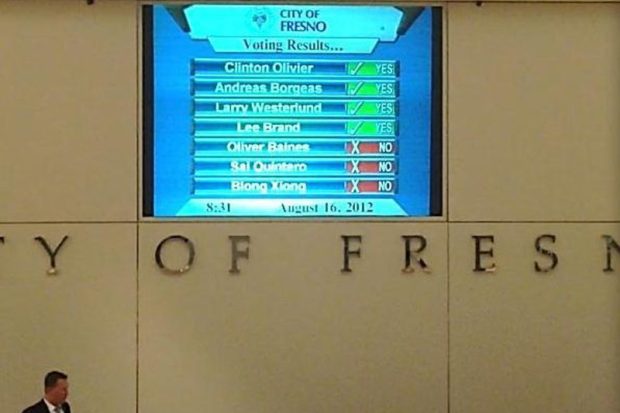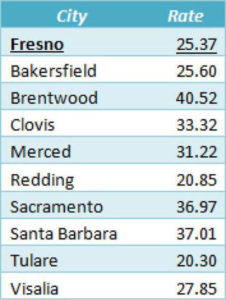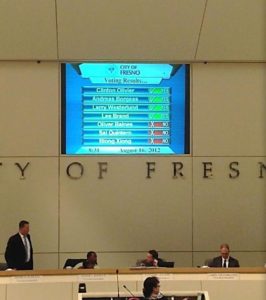
By Stan Santos
On Aug. 16, the Fresno City Council approved a motion to hire a consultant, identified as Robert Hilton, to prepare a Request for Proposal (RFP) that would open residential garbage collection for bids from private contractors.
As stated by City Attorney James Sanchez, “The matter before you tonight is to consider approval of a consultant agreement to develop a process for proposals to perform the residential solid waste collection. So, this would be the first step of a process, and obviously there are policy considerations on both sides for the Council, but approval today does not bind the Council to grant a franchise ultimately.”
The supporters of the city’s Solid Waste Division were headed by Mario Navarro, Fresno County Employees Association (FCEA) Executive Board member, who presented a persuasive PowerPoint presentation that cited many of the negative effects of privatizing waste collection, including the following:
- Higher trash rates to maximize profits
- No accountability to the citizens of Fresno
- Inferior customer service and quality of service
- Deferred maintenance of equipment leading to interruption of service
- Elimination of yearly community cleanup program
- Additional costs to senior, disabled and handicapped customers due to special handling service
Navarro also highlighted the many plusses of the City of Fresno Solid Waste Division, including the following:
- One of the lowest trash rates in California
- No additional costs for special handling services
- Yearly community cleanup program
- Customer accountability by elected officials
- Ranked No. 1 in the nation for recycling (although no longer considered so because franchising of commercial waste has caused reduced recycling and is the object of a lawsuit by Sunset Waste)


Navarro presented a comparison table with 10 cities, including several in the Central Valley, that own their trash utility and 10 entities that have privatized trash collection. In most cases, the difference in rates was twice as much for residents of privatized garbage collection. He challenged members of the City Council to find 10 cities that have privatized waste collection for five years or more and have lower rates than the City of Fresno currently has.
He also cited two addresses directly across the street from each other on Clinton Avenue: one is in the city and pays $16.51 per month for waste collection and the other is in the county and pays $35.36 per month to Allied Waste. He suggested that aside from the difference in standard collection fees, the City of Fresno offers senior citizen discounts, whereas Allied Waste offers none.
In regard to “private for profit” collection, Navarro cited a report by HF8 Consultants, which projected a short-term dip in rates to be followed by a 3% increase within five years and a 6% increase after that. After 10 years, rates would increase 45%.
As for “public no profit” collection, the Utility Advisory Committee and the R3 Consulting Group projected a 3% decrease for the next five years, reaching a total rate decrease of 15% and beyond within 10 years. In fact, the 3% decrease should have taken effect this year, however, according to Navarro, the mayor did not present this to the City Council for a vote.
Another slide showed alleged campaign contributions made since 2008 by Republic Services, Mid Valley Disposal and West Coast Waste Company totaling $6,400 to City Council member Lee Brand and $11,500 to City Council member Andreas Borgeas. The obvious point was that these contributions created a conflict of interest, and in the eyes of many audience members, the Council members had “sold their vote.” At a minimum, it created the appearance of inappropriate influence by the private trash haulers.
The presentation by the FCEA was followed by strong statements from Marina Magdaleno, business representative for Operating Engineers Local 39, and Dee Barnes, president of the FCEA. Magdaleno said she was “appalled by Lee Brand and Andreas Borgeas, who sold their vote for $11,500 and $6,000 plus.” She went on to cite specific discrepancies in the current proposal, as well as the privatization of the commercial garbage collection. Barnes cited a letter sent to the city clerk and challenged the Council members regarding the consultant’s report in regard to costs to consumers as well as the city. She also expressed similar concerns over the sale of city equipment to private haulers.
Vehicle Cost versus Sale Price
| Vehicles | Year | Description | Age | Cost | Sale Price |
| 1 | 2011 | 4 axle LNG front loader | 6 mos. | $275,448 | $56,336 |
| 2 | 2011 | 4 axle LNG front loader | 8 mos. | $258,012 | $62,000 |
|
8 |
2009 | 4 axle LNG front loader | 2 yrs. | $258,012 | $56,000–$62,000 |
| 5 | 2007 | 4 axle LNG front loader | 4 yrs. | $230,000 | $56,000–$62,000 |
| 3 | 2006 | 4 axle LNG front loader | 5 yrs. | $223,552 | $56,000–$62,000 |
| 9 | 2005 | 4 axle LNG front loader | 6 yrs. | $217,038 | $56,000–$62,000 |
| 11 | 2004 | 4 axle LNG front loader | 7 yrs. | $199,263 | $56,000–$62,000 |
Source: FCEA
The most glaring discrepancies are the 2011 models, with bare months of service, which were sold for less than 25% of their purchase price. The total balance sheet of city-owned vehicles turned over to private haulers would show a huge net loss if not for the practice of placing a net book value of zero for almost all the vehicles purchased through 2008. However, if you separate the 2007–2011 models, a total of 13 vehicles, the total net book value exceeds $1.9 million, yet they were sold for $769,874, or a loss of more than $1.2 million. Was this the result of standard or “creative” accounting practices?
These statements were followed by a dozen more from members of the audience hitting the Council with valid observations and criticisms of the process and reinforcing the need to take the issue to the electorate. Of the 60–80 members of the community who were present at different times, not one spoke in favor of the motion.

Council Member Quintero Pushes Back
Before the Council undertook the agenda item, Sal Quintero made a bold move and opened discussion on an option to take the issue to the voters. He thanked members of the community for sharing their thoughts and went on to state that he had been approached by many constituents who are concerned with the economy and that “even 10 dollars more a month; that can drive a family over the edge, as far as I’m concerned. With people watching all their pennies and that type of thing, it’s difficult.”
Reading from his prepared statement, he said, “To me, this is something that will affect every single resident within the city and I would like to let the people decide whether we should pursue this or not.” After acknowledging the upcoming county vote on a similar issue, he concluded, “I feel we should let the public decide if the privatization is something that should be pursued or not.”
He asked for assistance from the city attorney in clarifying the wording of his motion and received a second from Council Member Oliver Baines. Despite several points of clarification and process by the city attorney, Borgeas committed an embarrassing gaffe when he persisted in discussing the RFP. He stated in a dismissive tone, “For purposes, we are not limited to discussing Member Quintero’s ‘thing’; we are going into the substance of the contract.”
Council President Clint Olivier interrupted him stating, “The city attorney just said that we need to keep them separate and do one motion at a time, so since there is a motion on the table right now, the discussion has moved to the process motion.”
Undaunted, Borgeas went on to ask, “Sal, can you restate what the motion is?” After an additional brief explanation by the city attorney, he said, “I’m prepared to vote if my colleagues don’t have anything to say.”
Olivier restated, “The motion is to have the city attorney go and to prepare language on taking the issue of privatization out to the voters in a future election.”
Conclusion and the Road Ahead
This simple motion by Quintero was a courageous act, one which the community will certainly remember, despite the outcome. The votes lined up as they would for the later motion on the RFP: Council Members Quintero, Baines and Blong Xiong demonstrated their support of the workers and community in the face of the bare majority represented by Olivier, Borgeas, Larry Westerlund and Brand.
The arrogant attitude of Borgeas represents both the injustice in the process and the reasons for the community’s resistance. It is clear that this proposal has a predetermined outcome, regardless of the concerns voiced by the community or the need for transparency and equity.
Consolidation of city services and departments, such as the police and the sheriff’s office, was one alternative that many feel has not been thoroughly discussed, if considered at all. This was raised by Baines, who also brought up other options, including franchising electricity lines and charging banks for foreclosures that cause blight and require city services. He even suggested a public safety tax. He concluded saying, “Before I am ready to have this discussion, before we in essence cannibalize one of our successful city departments, we need to look everywhere else, we need to operate more efficiently and we need to have a truthful conversation about what a fee and a tax is and where we need to be looking for a savings.”
Another observation that received no response from the Council was Ordinance 2012-14, which authorized “the levy and collection of a property tax on taxable property in the City of Fresno for partial funding of the Fresno Fire and Police Retirement System and the Fresno City Employees’ Retirement System for the fiscal year beginning July 1, 2012.” This ordinance was signed by Mayor Ashley Swearingen on July 3, 2012, but has not been referenced in the discussion of the current privatization push.
If this was an option for resolving retirement fund deficits, would a similar initiative not be worth considering in order to alleviate cutbacks in city services, rate hikes and the loss of 173 jobs? On the other hand, is the goal of this initiative really to save money? Or is it part of the nationwide push by conservatives to shrink government, give private enterprise free rein and weaken their greatest opponent: labor unions?
For more information regarding this issue and to sign an online petition in support of city workers, visit www.fresnotrashscam.com.
*****
Stan Santos is an activist in the labor and immigrant community. Contact him at ssantos@cwa9408.org.
